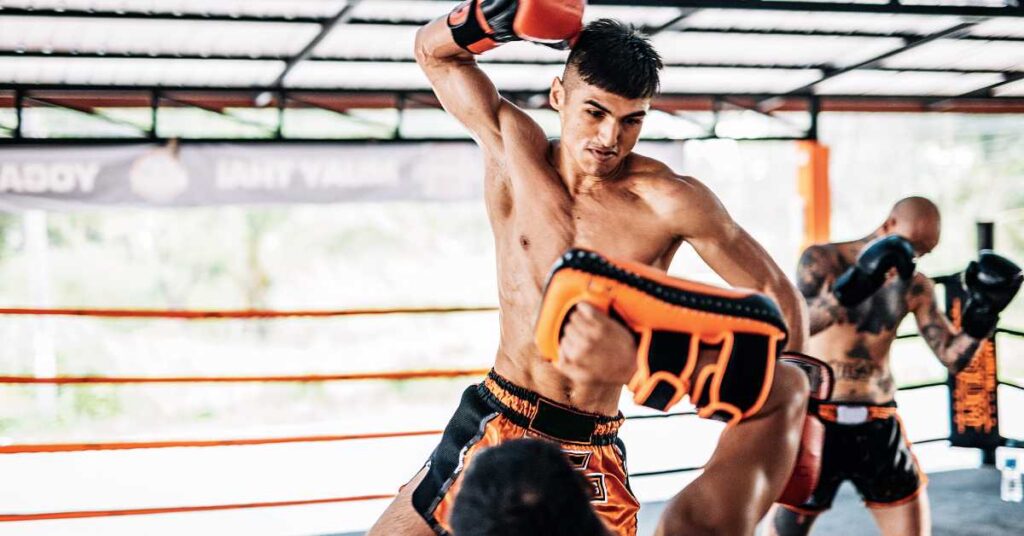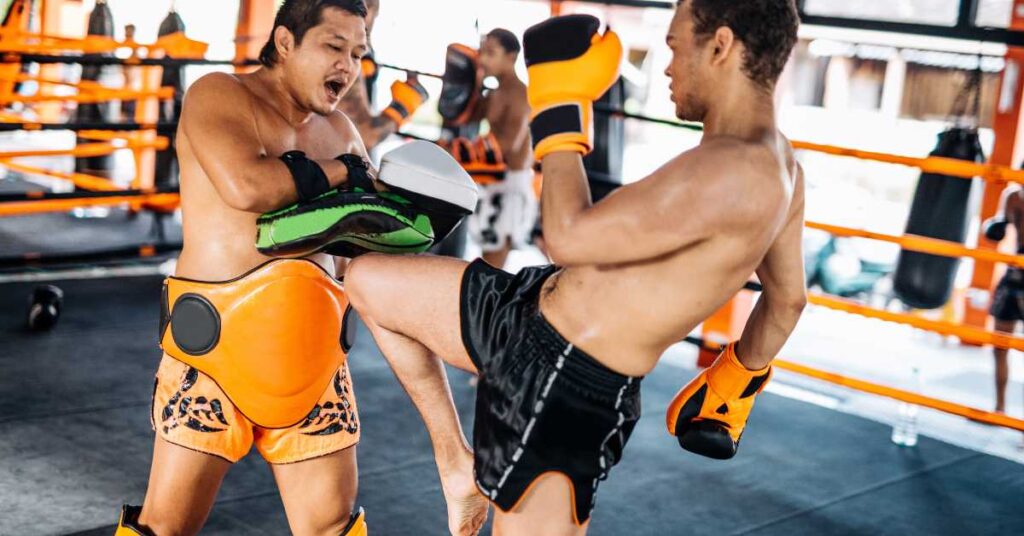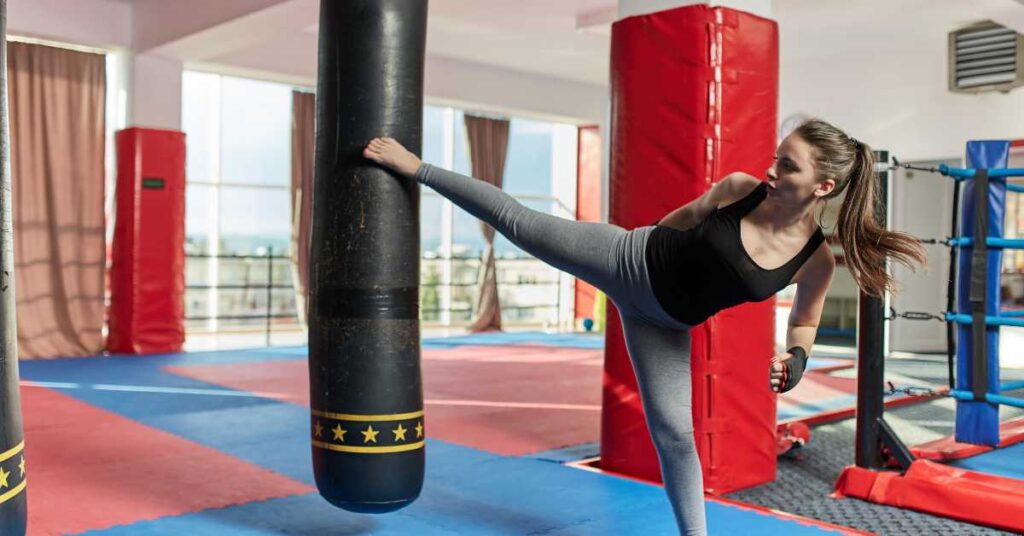Is Muay Thai better than boxing? Determining whether Muay Thai is better than Boxing depends on individual preferences, goals, and learning styles. Muay Thai offers a diverse range of striking techniques, making it more versatile and potentially more effective in self-defense situations. Boxing, on the other hand, emphasizes footwork, hand speed, and accuracy, which can be advantageous in certain contexts. Ultimately, the choice between Muay Thai and Boxing comes down to personal preference and what aspects of martial arts training most appeal to you.
As a martial arts enthusiast, I’ve always been curious about the age-old debate: is Muay Thai better than Boxing? Both sports have deep roots in history and have earned a dedicated following. In this blog post, we’ll explore various aspects of both martial arts to help you decide which one might be the better fit for you. Let’s dive in and start with a brief overview of the key differences between the two.
Is Muay Thai better than boxing?
In one corner, we have the jab-slinging, glove-wearing kings and queens of the ring – boxers! And in the other corner, we have the bone-crushing, elbow-bashing fighters of Muay Thai! Is Muay Thai really better than boxing?
Well, it depends on what you’re looking for. Boxing might be great for developing quick reflexes and upper body strength, but Muay Thai can take your skills to a whole new level. With knee and elbow strikes, Muay Thai fighters can go beyond the usual punches and jabs to create lethal combinations that will leave their opponents reeling. In the end, it all boils down to what you’re comfortable with.
Whether you’re a die-hard boxing fan or a hard-hitting Muay Thai enthusiast, the only thing that matters is that you’re passionate about your craft. So, let’s keep those fists flying and those kicks coming – it’s time to show off those skills!

What are the key differences between Muay Thai and Boxing?
Techniques and moves
Muay Thai, also known as “The Art of Eight Limbs,” is a martial art that originated in Thailand. It focuses on using the entire body as a weapon, incorporating strikes from fists, elbows, knees, and shins. On the other hand, Boxing, often referred to as “The Sweet Science,” is a sport that primarily uses punches for striking, with a strong emphasis on footwork and head movement for defense.
| Muay Thai | Boxing |
|---|---|
| * Punches | * Punches |
| * Kicks | |
| * Elbows | |
| * Knees |
Rules and scoring
While both sports involve striking, their rules and scoring systems are quite different. In Muay Thai, points are awarded for effective strikes, control, and technique. Clinching and sweeps are also allowed, adding a layer of grappling to the sport. In Boxing, points are scored through clean punches to the head and body, with no grappling or kicking allowed.
Training and conditioning
Muay Thai and Boxing have unique training methods that reflect the demands of each sport. Muay Thai training often involves heavy bag work, pad drills, and clinching practice. It also incorporates conditioning exercises such as running, skipping, and bodyweight exercises. Boxing training includes a mix of shadowboxing, bag work, pad work, and sparring. Both sports place a strong emphasis on cardiovascular conditioning and footwork.
Which is easier to learn?
Basic techniques
When starting out, you might find Boxing techniques easier to pick up due to its limited focus on punches. However, Muay Thai beginners can also learn basic strikes and combinations relatively quickly. The complexity of techniques increases as you progress in both sports.
Skill acquisition rate
The rate at which you acquire skills in either one, largely depends on your individual learning abilities, the quality of your coaching, and your dedication to practice. Some people might find Muay Thai more challenging due to the diverse range of techniques, while others may struggle with Boxing’s intricate footwork and head movement.
Factors affecting learning speed
- Coaching quality
- Individual learning ability
- Time spent practicing
- Prior martial arts experience
How does the physical demand of Muay Thai compare to Boxing?
Cardiovascular fitness requirements
Both Muay Thai and Boxing require a high level of cardiovascular fitness to perform at their best. However, Muay Thai tends to be more demanding due to the increased number of techniques and the inclusion of clinching. Boxing, while still physically demanding, often requires more explosive movements and agility.
Muscle groups targeted
Muay Thai and Boxing target different muscle groups due to their unique techniques. Muay Thai places a greater emphasis on leg strength for powerful kicks and knee strikes, as well as core strength for clinching. Boxing primarily focuses on upper body strength for punching power and stability.
| Muay Thai | Boxing |
|---|---|
| * Legs (kicks, knees) | * Arms (punches) |
| * Core (clinching) | * Shoulders |
| * Hips (kicks) | * Chest |
Flexibility and mobility
Flexibility and mobility are important factors in both Muay Thai and Boxing. Muay Thai practitioners often require more flexibility in their hips and legs to execute high kicks and maintain balance during clinching.
Boxers, on the other hand, need more upper body mobility for effective punching and head movement. Both sports benefit from good overall flexibility and mobility for injury prevention and improved performance.
Which is better for strength and conditioning?
Strength-building exercises
Muay Thai and Boxing both incorporate strength-building exercises into their training regimens. However, the specific exercises used may differ depending on the demands of each sport. Muay Thai often includes exercises such as squats, lunges, and calf raises for leg strength, while Boxing focuses more on push-ups, pull-ups, and shoulder exercises for upper body strength.
Endurance training
Both sports require a high level of endurance to maintain a strong performance throughout a match. Muay Thai and Boxing training sessions often include running, skipping, and other forms of cardio to build endurance. Additionally, both sports utilize high-intensity interval training (HIIT) for conditioning.
Comparison of overall fitness gains
Ultimately, both Muay Thai and Boxing offer excellent strength and conditioning benefits. The choice between the two will depend on your individual fitness goals and preferences. If you prefer a full-body workout that incorporates more varied techniques, Muay Thai might be the better choice. If you’re more interested in building upper body strength and improving your hand-eye coordination, Boxing might be the way to go.
Can Muay Thai beat Boxing?
Instances of cross-discipline fights
There have been instances of cross-discipline fights between Muay Thai and Boxing practitioners, with mixed results. The outcome of such a match depends on various factors, such as the fighters’ skill levels, experience, and adaptability.
Strengths and weaknesses of each martial art
Each martial art has its own strengths and weaknesses. Boxers tend to have superior hand speed, accuracy, and footwork, while Muay Thai fighters have a more diverse arsenal of strikes and the ability to clinch. The winner of a cross-discipline fight will often be the one who can best capitalize on their strengths while minimizing their weaknesses.
Factors influencing fight outcomes
- Skill level
- Experience
- Adaptability
- Game plan and strategy
- Conditioning
Is Muay Thai tougher than boxing?
Comparison of physical and mental toughness
Both Muay Thai and Boxing require a high level of physical and mental toughness. Muay Thai, with its powerful kicks, knees, and elbows, can be more punishing on the body, while Boxing’s constant head movement and footwork can be mentally exhausting. It’s difficult to definitively say which sport is tougher, as individual experiences and preferences will vary.
Training intensity and rigor
Training in either Muay Thai or Boxing can be incredibly intense and rigorous. The level of toughness required will depend on the gym, the coach, and the individual’s dedication to training. Both sports require discipline, determination, and perseverance.
Competitive nature of each sport
Both Muay Thai and Boxing have a highly competitive nature, with fighters pushing themselves to their limits in training and competition. Each sport has its own unique challenges, and the toughness required for success in either sport cannot be underestimated.
Is Muay Thai stronger than boxing?
Power and force generation
Power and force generation in striking techniques will vary between Muay Thai and Boxing. Muay Thai strikes, such as kicks and knees, often generate more force due to the mass and velocity of the limbs involved. Boxing punches can also generate significant power, especially when executed with proper technique and body mechanics.
Striking techniques comparison
Comparing striking techniques between Muay Thai and Boxing is difficult, as each sport has its own unique strengths. Muay Thai strikes, particularly kicks, are known for their power and ability to inflict damage. Boxers, on the other hand, often possess greater hand speed and accuracy, allowing them to land clean, powerful punches with precision.
Implications for effectiveness
Determining which martial art is stronger or more effective depends on the context and the goals of the practitioner. In a self-defense situation, Muay Thai’s diverse range of powerful strikes might prove more effective. However, in a Boxing match, a skilled boxer’s speed, accuracy, and footwork would likely give them the edge.

What’s better for a street fight: Boxing or Muay Thai?
Real-life scenarios and effectiveness
In a real-life street fight, both Muay Thai and Boxing have their merits. Muay Thai offers a diverse range of powerful strikes, including kicks, knees, and elbows, which could be effective at various ranges. Boxing, with its focus on footwork and head movement, can help evade and counter attacks.
Versatility of techniques
Muay Thai’s versatile techniques could potentially provide an advantage in a street fight, as they allow practitioners to attack and defend from multiple angles and ranges. Boxing’s emphasis on punches, while still effective, might be more limited in some situations.
Legal and ethical considerations
It’s important to note that engaging in a street fight can have serious legal and ethical consequences. The best approach in any dangerous situation is to avoid violence whenever possible and prioritize personal safety and the safety of those around you.
Which is more effective for self-defense?
Range of techniques and their application
In terms of self-defense, Muay Thai’s range of techniques provides practitioners with more options to defend themselves in various situations. Kicks, knees, and elbows can be effective at different ranges, and the ability to clinch allows for control and grappling.
Practicality in real-life situations
While Boxing’s punches can be effective in self-defense situations, the sport’s limited focus on strikes might not be as versatile as Muay Thai. That being said, Boxing’s emphasis on footwork and head movement can be highly beneficial in evading and countering attacks.
Pros and cons of each martial art for self-defense
| Muay Thai | Boxing |
|---|---|
| Pros: | Pros: |
| Versatile range of techniques | Excellent footwork |
| Effective at multiple ranges | Precise head movement |
| Clinching ability | Hand speed and accuracy |
| Cons: | Cons: |
| Limited grappling techniques | Limited range of techniques |
| Less emphasis on evasive footwork | Less effective at longer ranges |
What is Muay Thai’s weakness?
Limitations in techniques
While Muay Thai has a diverse range of striking techniques, it lacks the extensive grappling techniques found in other martial arts, such as Brazilian Jiu-Jitsu or wrestling. Additionally, Muay Thai’s footwork is generally less evasive compared to Boxing.
Areas of vulnerability
Due to its focus on striking, Muay Thai practitioners might be vulnerable to takedowns and grappling techniques from opponents who specialize in those areas. Furthermore, Muay Thai fighters might struggle against opponents with superior footwork and head movement, as seen in Boxing.
How to overcome these weaknesses
To overcome these weaknesses, Muay Thai practitioners can cross-train in other martial arts to develop a well-rounded skill set. Training in Boxing can help improve footwork and head movement, while learning grappling techniques from Brazilian Jiu-Jitsu or wrestling can address vulnerabilities on the ground.
By incorporating complementary skills and techniques from other disciplines, a Muay Thai fighter can become a more versatile and adaptable martial artist.
How does the learning curve differ between Muay Thai and Boxing?
Time and effort required for mastery
Both Muay Thai and Boxing require considerable time and effort to master. The learning curve for each sport will vary depending on the individual’s natural aptitude, dedication to training, and quality of coaching.
While some people might find Boxing’s limited focus on punches easier to learn initially, others may struggle with its intricate footwork and head movement. Conversely, Muay Thai’s diverse range of techniques can be both exciting and challenging for beginners.
Progression and ranking systems
Muay Thai and Boxing have different progression and ranking systems. In Muay Thai, fighters typically earn their rank based on their fight experience and performance in the ring. There are no formal belt rankings as seen in other martial arts.
Boxing uses a system of weight classes and rankings based on win-loss records, with fighters competing for titles at various levels, such as regional, national, and world championships.
Availability of trainers and gyms
The availability of trainers and gyms will depend on your location. In some regions, Muay Thai gyms may be more prevalent, while Boxing gyms might be more common in others. In general, larger cities tend to have a wider selection of gyms and trainers to choose from for both sports.
Can you cross-train in both Muay Thai and Boxing?
Benefits of cross-training
Cross-training in both Muay Thai and Boxing can provide numerous benefits, including:
- Developing a well-rounded skill set
- Enhancing footwork and head movement
- Improving overall striking ability
- Gaining a broader understanding of martial arts
Complementary skills and techniques
Many skills and techniques from Muay Thai and Boxing complement each other. For example, Boxing’s focus on footwork and head movement can help Muay Thai fighters evade attacks more effectively, while Muay Thai’s diverse range of strikes can add depth and variety to a boxer’s arsenal.
Precautions and potential drawbacks
While cross-training can be beneficial, it’s important to be mindful of potential drawbacks. Mixing techniques from different martial arts can sometimes lead to confusion or a dilution of skills. Additionally, overtraining and burnout can occur if you don’t allow for adequate rest and recovery. To minimize these risks, ensure that you have a clear training plan and work with knowledgeable coaches who can guide you through the process.

Which martial art is better for overall fitness and personal development?
Physical fitness benefits
Both Muay Thai and Boxing offer excellent physical fitness benefits. Muay Thai provides a full-body workout that targets multiple muscle groups, while Boxing primarily focuses on upper body strength, hand-eye coordination, and agility. Depending on your individual fitness goals, one sport may be more appealing than the other.
Mental discipline and focus
Muay Thai and Boxing both require a high level of mental discipline and focus. Consistent training in either sport can help develop concentration, determination, and perseverance, which can be beneficial in many aspects of life.
Confidence and self-esteem
Participating in martial arts like Muay Thai or Boxing can lead to increased confidence and self-esteem. As you progress and improve your skills, you’ll likely experience a sense of accomplishment and personal growth that extends beyond the gym or ring.
Conclusion
In conclusion, it’s challenging to definitively say whether Muay Thai or Boxing is better, as each sport has its own unique strengths and challenges. The right choice for you will depend on your individual preferences, goals, and learning style. If you’re still unsure, why not try both and see which one resonates with you the most?
You might find that cross-training in both martial arts provides the best of both worlds, giving you a well-rounded skill set and a deeper appreciation for the intricacies of each sport. Ultimately, the most important factor is your enjoyment and commitment to your chosen martial art, as this will fuel your passion, dedication, and growth as a martial artist.
So, lace up your gloves, step into the ring or onto the mat, and discover the exciting world of Muay Thai and Boxing for yourself!


